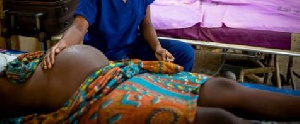The Greater-Accra Regional Health Director, Dr Linda A. Vanetoo, on Wednesday said the Region recorded the highest number of maternal deaths last year, with 201 cases nationwide.
She said Ashanti Region followed closely with 200 reported maternal deaths, lamenting that young health professionals needed to do their work well to help save lives, declaring that “our women must survive and they need us to survive”.
Dr Vanetoo, who made the disclosure in Accra at a Breakfast Meeting with Health Specialists in the Region, urged health professionals to show interest in every pregnant woman under their care, treat each pregnancy as a special case, follow up with correct documentation and maintain surveillance on each pregnant woman.
She said in order to provide better health care delivery to the people, leadership must be innovative and practical at all levels, adding that commitment must also be from the top to the bottom, and “this should be seen by all, including clients and relatives.”
Dr Vanetoo said determination must be visible, coupled with available logistics and resources, stating that staff must celebrate their success stories such as zero maternal deaths.
Dr Ebenezer Oduro-Mensah, the Family Physician at the Ridge Regional Hospital, explained that of the number of maternal deaths recorded in 2013 in the Region, an analysis of 52 cases revealed that the underlying cause of deaths included haemorrhage – 30.8 per cent, hypertensive diseases – 26.9 per cent, ruptured uterus – 9.6 per cent, abortion -7.7 per cent, embolism 5.8 per cent, sickle cell disease 3.8 per cent, ectopic gestation 1.9 per cent, and others 13.5 per cent.
He said of the number, 52 per cent had more than four clinical attendance, “yet we lost them”, adding that most maternal deaths occurred as a result of lack of blood at the blood banks, poor monitoring, delayed referrals and poor interpretation of examination findings.
Dr Emmanuel K. Srofenyah, Consultant Obstetrician at the Ridge Regional Hospital, announced that a team of specialists would be visiting health facilities in the Region, to provide in-house training for midwives and other health professionals in the area of maternal and child health care.
Dr Patrick Aboagye, Deputy Director, Reproductive and Child Health of the Ghana Health Service (GHS), advised health professionals to take the issue of auditing very seriously, since findings would help improve upon health care delivery.
Dr Cynthia Bannerman, GHS Deputy Director, assured that government and the GHS would continue to provide the needed support to all health facilities, to ensure better health care delivery in the country.
Dr Isabella Sagoe-Moses, National Child Health Coordinator, GHS urged health professionals to strengthen their systems in order to overcome the numerous challenges facing the sector.
Dr Gloria Quansah Asare, GHS Deputy Director-General, lauded the Region for coming out with such an impressive idea to harness health care delivery.
She urged medical professionals to work as a team, and to help build the capacity of staff under them to boost health care delivery.
She said Tema General Hospital was currently in difficulty, due to the huge number of patients patronizing it, and asked for assistance to meet the needs of the hospital.
Health News of Thursday, 1 May 2014
Source: GNA

















